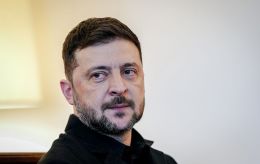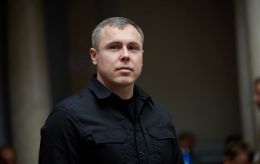To war at 18: Story of volunteer Rambo, who prepared for battle since childhood
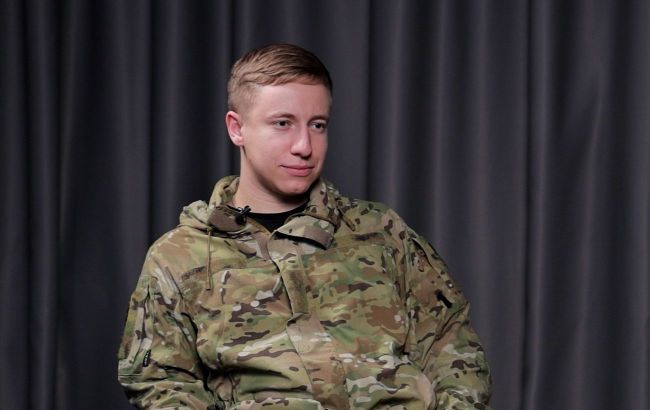 Nazar Hlushchenko, a volunteer from the 95th Brigade of the Armed Forces of Ukraine (photo: RBC-Ukraine)
Nazar Hlushchenko, a volunteer from the 95th Brigade of the Armed Forces of Ukraine (photo: RBC-Ukraine)
Nazar "Rambo" Hlushchenko joined the military immediately after turning 18. First, he served in infantry, then drones, reconnaissance, and special operations. Rambo serves in the 95th Air Assault Brigade of the Armed Forces of Ukraine, with which he fought from Donbas to the Kursk region. In an interview with RBC-Ukraine, Nazar shared his journey through the war, his first battles, and what motivates him to stay in the fight.
Beginning of war. 18-year-old volunteer
Nazar had just turned 18 when he came to the military enlistment office at the end of February 2022. He and his father decided to volunteer for the newly formed units based on the Territorial Defense Forces. On February 26, they couldn't get anything processed - lines, confusion, chaos. But already on the 27th, they were handed rifles and got on a bus.
— Where are we going?
— To Donbas.
"And that's it. No gear, no uniform. I had only sneakers, a jacket, and a sweatshirt," Rambo recalls. But he says that despite all the problems, there was confidence in their actions, because the unit was formed from soldiers who already had significant combat experience.
"The guys around me were experienced - they had been through Pisky, Mariupol, since 2014. So the unit quickly bonded, there was a sense of brotherhood, and we kept going like that for a whole year," Rambo shares.
Nazar admits he was quite lucky to get into the army at all, as in the early days of the war, many men under 25 were being turned away from enlistment offices. "My platoon and I ended up on one list, we were mobilized, then issued military IDs, and from there the process went smoothly," Rambo recalls.
Straight to front instead of conscription
Despite his young age, Nazar was mentally prepared. Since he was 9, he had been training in the youth patriotic organization Moloda Sich, led by an Afghan war veteran. It was tough - physically, emotionally, and he often cried. But it was during that time, the young man says, that he was hardened.
"At 9, I was thrown into the whirlwind of patriotism and militarism. We worked with weapons a lot, learned about them, and fired air rifles. But the biggest chunk of knowledge came from theory," Nazar recalls.
It was hard for a 9-year-old boy. Taken from home and literally thrown into the woods. But now Rambo is glad it happened, because that experience helped him endure challenges on the battlefield.
"I want to say a big thank you to Anatolii Mykolaiovych for his work. After his camps, many joined the Armed Forces, served, and still serve in different reconnaissance units. I believe his motivation and training gave us a lot. His grit, his desire, and love for the military craft," says the young soldier.
Family upbringing also played a major role in forming his national identity. His parents instilled a strong sense of self. "My family shaped my national consciousness. What we talked about, what books we read, what language we spoke - that was very important too," Nazar explains.
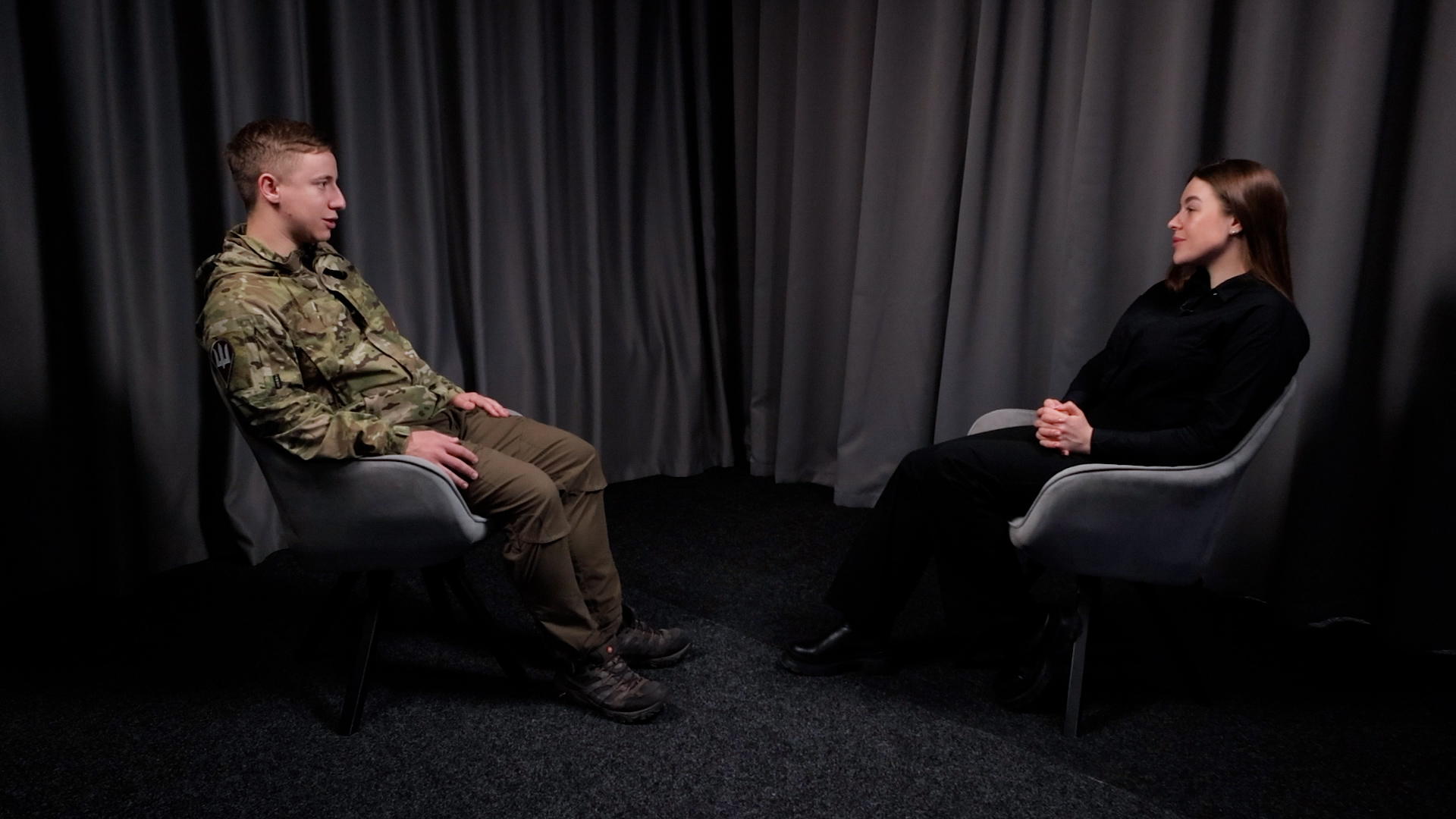 Nazar was morally ready to serve in the Armed Forces, despite his young age (photo: RBC-Ukraine)
Nazar was morally ready to serve in the Armed Forces, despite his young age (photo: RBC-Ukraine)
First battles - Zaporizhzhia direction
Early May 2022. Nazar's unit entered Zaporizhzhia when the enemy was advancing on Huliaipole.
"That was right when Russian forces were pushing toward Huliaipole and Velyka Novosilka. And that's when they were pushed back, step by step. There were also local Territorial Defense Forces brigades with us - just regular guys with rifles stopping tanks, and the Russians panicked and pulled back," Rambo recounts.
After a successful joint operation with neighboring units, they were able to hold the ground. Nazar's first combat took place in early May 2022, during the initial attempts at counteroffensive.
"We had some grenade launchers and that was it. No vehicles, just our own pickups. And a tank rolled in against us, shelling the area with direct fire. I remember it was terrifying. It was terrifying then, too, but we had no choice but to retreat. We had to hold that area. And we held it," the young soldier recalls.
Rambo says that period was a different kind of war, very different from now. There weren't as many drones, but there were other challenges, especially with logistics. Still, it didn't discourage or stop them.
"If we had a chunk of salo to eat - that was good enough, that's how we got by. And that's how we fought that summer. In May, our battalion launched an offensive and liberated the village of Novopil," Rambo says.
At war with his father in same trench
Nazar fought side-by-side with his father. According to the soldier, this was both a blessing and a burden. "It's a mixed bag. It's great to have a loved one with you. Great when your dad watches over you, tells you to eat, pulls out a can of stew - we'd open it and eat it with hardtack," the military volunteer says with a smile.
But being with family at the front is tough. Nazar recalls that early in the war, there were often communication problems when Starlinks were still rare. "Sometimes there was no contact with me, and shelling started. My dad would go gray with worry - he didn't know where I was or what was happening. Same for me and my mom – when we were both on the front line and out of contact," Nazar explains.
Rambo remembers times when they had to walk for half an hour just to get a signal, or even climb trees to send one message to his mom that he was okay.
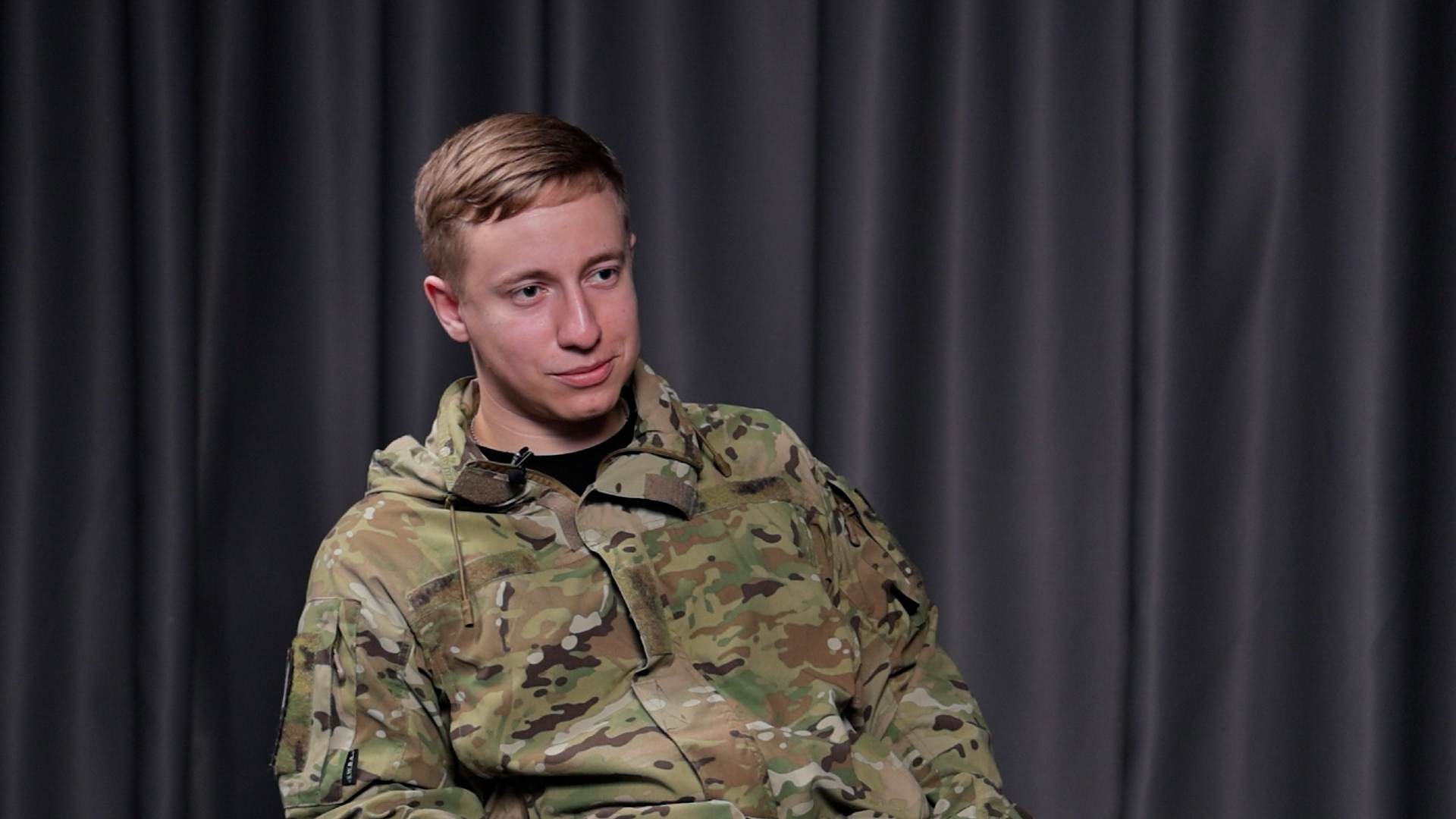 In his first battles, the young man, together with his comrades, had to push the enemy out of the Zaporizhzhia direction (photo: RBC-Ukraine)
In his first battles, the young man, together with his comrades, had to push the enemy out of the Zaporizhzhia direction (photo: RBC-Ukraine)
"Going to war with your father - that's an interesting experience. But I wouldn't recommend it to anyone, because you can't really recommend something like war. Overall, it's a good experience. But it would be better if it never happened," Nazar reflects.
One of the most vivid memories he has is of the two of them praying together during a tank shelling: "It's hard to imagine sitting in the same trench with your father while a tank is firing at you, trees and leaves raining down over the trench. And there we are, praying together. And you think - thank God we're alive. Thank God it's like this."
From infantry to recon and drones
After the unit was restructured, Nazar moved to the 78th Regiment and later to the Airborne Assault Forces – particularly, the 95th Brigade – where he became a drone operator.
"At first, I flew Mavics. Back then, it was rare. Now it's the standard. Later, FPVs, strike drones, recon behind enemy lines," Rambo says.
The young man recalls how, near Robotyne, the skies were full of both enemy and Ukrainian drones, adjusting artillery, destroying vehicles, and building entire operations based on drone intel. But the enemy quickly learned from our tactics.
"They (Russians - ed.) started copying our technology. Not just aerial recon, but particularly strike drones – they started replicating and adopting our systems. Soon, there were tons of enemy FPVs. And a Mavic – it's a simple thing. The Chinese sell them everywhere, so anyone can buy one," the Ukrainian soldier explains.
Defense of Toretsk and Kursk region
With the 95th Air Assault Brigade, Rambo operated fixed-wing reconnaissance drones. At first, it was missions in the Lyman direction, then battles for Toretsk.
"I saw how in just a month of our flights, from the first day when Toretsk still looked like a city… and by the time we pulled out, not much was left. Just a small part of it remained more or less intact. That's where the fighting was," Nazar says.
"Our brigade did a solid job. Of course, we lost guys, our comrades. But at that point, we stopped the enemy's rapid advance," the young soldier remembers.
Then came an operation inside Russia, in the Kursk region. While the official goal of the operation was classified, Rambo says it was important to fight not only on Ukrainian soil. That gave them moral strength.
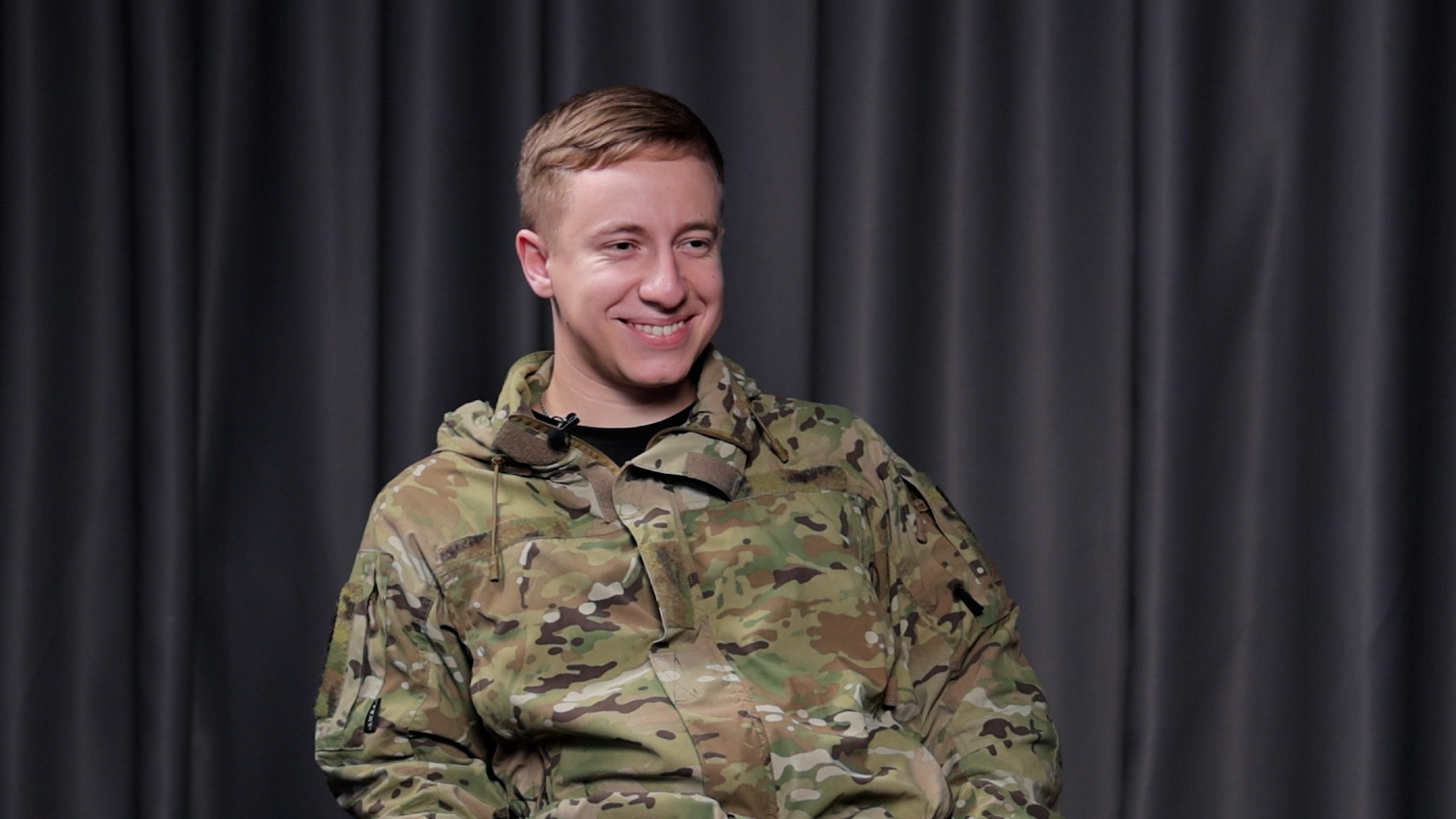 As part of the 95th Air Assault Brigade, Rambo operated on aircraft-type reconnaissance drones (photo: RBC-Ukraine)
As part of the 95th Air Assault Brigade, Rambo operated on aircraft-type reconnaissance drones (photo: RBC-Ukraine)
"It was a good advance. Proper mini-breaches were made, and bridges were rebuilt where they'd been destroyed. We also planned several backup main routes for equipment and transport," Nazar explains.
However, communications became a serious issue in enemy territory. In the Kursk region, Starlink didn't work, and Ukrainian cell service didn't reach. Eventually, those problems were resolved, but they caused disruptions early on.
"If we had better communication, the result would've been better. Sometimes convoys stopped because they didn't know where to go. They couldn't orient themselves or contact command," the Ukrainian soldier says.
On motivation and injustice
Until recently, Nazar didn't receive the benefits that contracted soldiers do. He supports the new one-year contract and the 1 million hryvnias payment for those under 25, but admits - those who went first had it harder.
"I feel a little resentful, but it's better for young people to go now with motivation than not go at all. Your home is your responsibility. No one else will protect it for you," Rambo emphasizes.
At the end of the conversation, the young soldier addresses those still hesitating:
"Either we fight now, or we live under occupation later. This isn't about politics - it's about your mother, your home, your future. If you can't fight, help the rear, work for the Armed Forces. But don't just sit on the sidelines."
